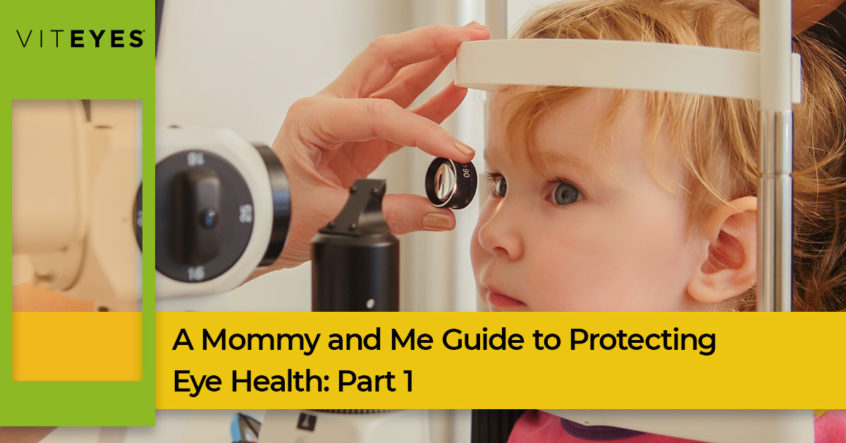As a new mother, you are undoubtedly flooded with worries you never even knew existed prior to having a child of your own. Worrying about the health and welfare of your baby is perfectly normal, but you should feel rest assured that they are much more durable than you may imagine. At Viteyes, we see here to support the eye health of your entire family from newborn to the elderly, and every stage in between. Whether you take our eye support vitamins or use our website as a resource for information, we are here for you. Join us in today’s post as we help quell some of your new mom fears by offering some tips to protect both yours and your baby’s eyes from delivery onward.
Vision and Pregnancy
Before we jump into things that you can control and how you can support your eye health and protect your vision, we would be remiss not to mention the visual changes that could occur during pregnancy. Not every woman experiences changes in their vision, but normal changes during pregnancy include:
Reduced tear protection — you guessed it, dry eyes!
Increased pressure and swelling — can blur vision and make contact wear uncomfortable
Increased susceptibility to eye infections like conjunctivitis
Reduced peripheral vision
Change in eye color
For most women, these changes resolve after pregnancy but be patient and visit your eye doctor if you are concerned.
Make Eye Contact
This may seem like an easy thing to do since gazing at your baby is something precious. However, in a world where we are all stretched in so many directions, you may sometimes need to remind yourself to stop and look at your baby. Eye contact is important for both you and your baby. For you, it is a great stress reducer and helps you bond with your baby. It also gives your eyes a chance to relax from all the screen time and bright lights in the world around you. For your baby, it is helping to challenge their vision and give them something to focus on. By 4 months of age, it is also helping them to mimic expressions and validating their worth. By 7 months, your baby’s vision is fully developed and they love looking at faces and making eye contact. Support their vision and eye health by simply making eye contact.
Be Proactive
It is never too early or too late to discuss your eye health concerns with your doctor or your baby’s pediatrician. If your child is not meeting “normal” developmental milestones including looking at you, following objects, or looking in the direction of a mirror, it is okay to get your pediatrician involved. Best case scenario, they will tell you your baby is perfectly healthy and normal and simply operating on their own developmental timeline. The worst-case scenario is your diligence has clued them into vision challenges early on and interventions can be in place as early as possible. For yourself, if you have any questions or concerns about the change in vision or eye health, have a discussion with your OB/GYN at your postpartum followup, consult your primary care physician, or simply make an appointment with your eye doctor. Don’t have one? Now’s a great time to get one!
Stay Hydrated
There is a strong correlation between hydration and eye health. Your eye is surrounded by fluid which serves to protect your eye by washing away debris every time you blink. Staying well-hydrated is the key to optimal eye health, especially in times of high hormone levels, stress, and lack of sleep — sounds like pregnancy and postpartum! Normal pregnancy hormones and those that help you produce breast milk can dry your eyes, increasing your daily water intake needs — plus, it will support breastfeeding if that is your plan. Your baby should also stay hydrated to promote optimal eye development and overall wellbeing.
Now that we have discussed a few things you can do during pregnancy and the postpartum timeframe to support yours and your baby’s eye health, stay tuned to part two of this two-part series where we continue the discussion with some mommy and me tips. In the meantime, you can visit our online resources for more information about general eye health and browse our eye supplements.
Related Article: Encouraging Eye Nutrition in Kids and Teens
